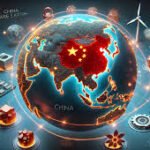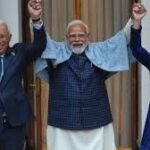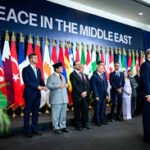Palestine and China’s growing aspirations as a global power are becoming increasingly evident in its diplomatic, economic, and strategic maneuvers on the world stage. The recent Beijing Declaration, which saw China coordinating a meeting of 14 Palestinian factions in Beijing for a united struggle against Israel, is a striking example of these ambitions. This development marks a significant moment in international relations, illustrating China’s evolving role and its potential impact on global politics.
China’s decision to facilitate this meeting represents a substantial shift in its foreign policy, traditionally characterized by non-interference. By stepping into the complex and fraught Israeli-Palestinian conflict, China signals its intention to engage more deeply in global issues that have long been dominated by Western powers, particularly the United States. This move is strategic, aligning with China’s broader objectives of expanding its influence and asserting itself as a key player in international diplomacy.
The Beijing Declaration emphasizes Palestinian unity in their struggle against Israel, aiming to bridge the deep-seated divisions that have long weakened their cause. China’s involvement here is significant for several reasons. Firstly, it positions China as a mediator capable of handling complex, multi-faceted conflicts, a role traditionally occupied by the U.S. and its allies. This could be a game-changer in Middle Eastern politics, potentially providing an alternative to the often criticized U.S.-led peace efforts, which many Palestinians view as biased towards Israel.
China’s engagement in the Middle East is also driven by its economic interests. The region is crucial for China’s Belt and Road Initiative (BRI), an ambitious infrastructure and economic development project aimed at enhancing global trade routes. By fostering relationships with Middle Eastern countries, including through mediation efforts, China aims to secure its economic interests and ensure the stability needed for the success of the BRI. This strategic engagement also serves to diversify China’s energy sources, as the Middle East remains a vital region for oil and gas supplies.
Moreover, the meeting in Beijing highlights China’s tactical use of soft power to extend its influence. By promoting itself as a neutral and balanced mediator, China seeks to build trust and credibility among developing nations and those disillusioned with Western hegemony. This approach contrasts with the more direct and often militarized interventions by the West, allowing China to cultivate a more favorable image and potentially garnering support in international forums.
The implications of China’s involvement for the Israeli-Palestinian conflict are profound. A unified Palestinian front, as sought through the Beijing Declaration, could enhance the Palestinians’ negotiating position and international support. Historically, internal divisions among Palestinian factions, such as between Fatah and Hamas, have diluted their effectiveness in negotiations and resistance efforts. If China can help bridge these divides, it may lead to a more coordinated and potent Palestinian strategy, challenging Israel’s diplomatic and security paradigms.
For Israel, China’s growing role presents both opportunities and challenges. On one hand, Israel has been keen to strengthen its economic ties with China, benefiting from investments and technological exchanges. On the other hand, China’s overtures to Palestinian factions might strain these relations, compelling Israel to carefully balance its economic interests with its security and political concerns. This delicate balancing act will require astute diplomacy and strategic foresight from Israeli policymakers.
Regionally, China’s engagement could reshape alliances and power dynamics. Countries in the Middle East may increasingly look to China as a counterbalance to U.S. influence, especially if they perceive Chinese diplomacy as more equitable and less interventionist. This could lead to a realignment of regional politics, with China emerging as a pivotal player in Middle Eastern affairs. Such a shift would have broader implications for global geopolitics, challenging the traditional Western dominance in the region and potentially leading to new alliances and rivalries.
Internationally, China’s active role in the Israeli-Palestinian conflict signals its broader aspirations to reshape the global order. As China continues to rise economically and militarily, it seeks to translate this power into diplomatic influence. The Beijing Declaration is part of this strategy, showcasing China’s capability to mediate in longstanding conflicts and asserting its vision for a multipolar world. This development could prompt other global powers to reassess their strategies and engagement in the Middle East and beyond, recognizing the need to adapt to China’s growing influence.
The U.S., in particular, may need to recalibrate its approach. Historically, the U.S. has been the primary mediator in the Israeli-Palestinian conflict, but its perceived bias towards Israel has often undermined its credibility among Palestinians. China’s entry into the fray provides a new dynamic, potentially offering an alternative path for peace efforts. This could force the U.S. to adopt a more balanced stance or risk losing its influence in the region. Additionally, other Western powers might also need to reconsider their policies and alliances in response to China’s growing role.
In conclusion, the Beijing Declaration and China’s coordination of the meeting of 14 Palestinian factions underscore China’s growing aspirations as a global power. This development highlights China’s strategic interests in the Middle East, its use of soft power, and its broader ambitions to reshape international diplomacy. The potential for a unified Palestinian front presents new challenges and opportunities for regional and global stakeholders, indicating a shift in power dynamics that could have far-reaching implications. As China continues to assert itself on the world stage, its influence in global politics is set to expand, reshaping alliances, strategies, and the geopolitical landscape in significant ways.





Leave a Reply